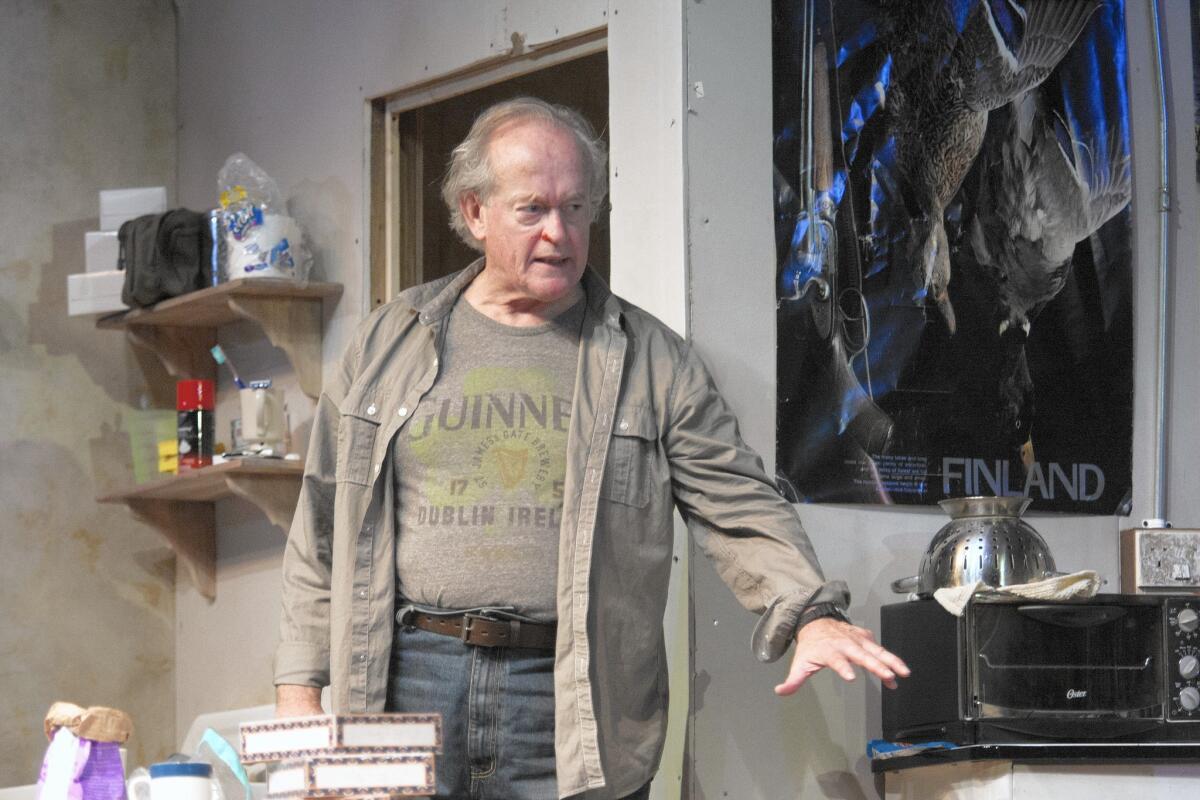Review: Reaching toward the light in ‘The Night Alive’

The decrepit state of Tommy’s room, with its piles of rubbish and mildewy towels thrown all over the place, is a reflection of his life. Estranged from his wife, he has been renting a room in his Uncle Maurice’s house near Dublin’s Phoenix Park for the last two years and getting by with odd jobs that he takes with Doc, his slow-witted sidekick.
The protagonist of Irish playwright Conor McPherson’s enigmatically fascinating play “The Night Alive,” which opened Wednesday at the Geffen Playhouse, Tommy (played with cavernous depths of gruff emotion by Paul Vincent O’Connor) is a middle-aged man who has by all appearances accepted defeat.
“You’re just knocking the days off the calendar,” explodes Maurice (Denis Arndt), who raised Tommy with his late wife and is sickened by the sight of his messy despondency. Tommy, who grunts when he realizes that he has once again mistaken the dog biscuits for cookies, is beyond caring what people think.
But something occurs to rouse Tommy from his stuporous routine. While out getting chips, he rescues a woman who was getting her face bloodied by her boyfriend. When the play begins, Tommy is ushering her into his flat to clean her up.
It turns out that Aimee (a wonderful and waifish Fiona O’Shaughnessy) is a prostitute who could use a place to stay. Tommy offers her shelter and even pays her for a minor (though to him major) sampling of her professional services.
It’s not long before Tommy becomes smitten. Kindly Doc (Dan Donohue), who often bunks with Tommy, initially fears being displaced by this mysterious woman. Maurice, a tyrannical and occasionally tipsy guardian of his property, warns her, “I can’t have any trouble. And Tommy doesn’t need any trouble.”
But a tentative equilibrium emerges. Doc shares wisdom from “How to Survive Life-Threatening Situations,” a book that turns out not to be as impractical as it sounds. And at one point he joins Aimee and Tommy as they groove to Marvin Gaye’s “What’s Going On?” — the title of which, when spoken by Tommy, sounds as though it should be affixed to one of Samuel Beckett’s absurdist comedies.
This domestic balance, however, is rudely disrupted when a well-dressed psychopath (played by Peter O’Meara) comes hunting for Aimee. He represents the malevolent force that is always shadowing the muddling characters of McPherson’s plays.
The gentleness of this bedraggled crew is touching — McPherson zeros in repeatedly on moments of compassion and tenderness — but wickedness is afoot. There’s a fable-like quality to the way the author juxtaposes darkness and light in “The Night Alive,” which resembles at times a short story by O. Henry, indebted to Dickens and with biblical overtones.
McPherson has described the play as a modern day Nativity tale. And although there’s not an infant messiah on the premises, there is a contest between decency and savagery, charity and exploitation, and faith and despair. The pitched battle between good and evil, of perennial interest to McPherson, is here conveyed in the form of a question: What kind of story will you choose to guide you on your bewildering path?
The production, directed by Geffen Artistic Director Randall Arney, is effective if sometimes overly blunt. The scenic design by Takeshi Kata, although superb in its shabby realism, doesn’t quite let in enough of the play’s mystery.
When I saw the play, under McPherson’s direction, at London’s Donmar Warehouse, a quality of undefined menace was unmistakably part of the drama. That same edge isn’t quite there at the Geffen, and as a result the transitions between quotidian moments and harrowing ones can feel somewhat artificial.
But Arney’s staging preserves the essential yarn-spinning pleasure of the work. The supporting cast may not compare to McPherson’s, but O’Shaughnessy steers clear of sentimentality with her appropriately ethereal portrayal of Aimee; Arndt finds the generosity within Maurice’s irascibility; and Donohue’s Doc has the affectionate nature of a dog that returns minutes after being screamed at with its head bowed, hoping to be stroked.
Best of all, O’Connor delivers a tremendously stirring performance that burrows deep into Tommy’s fading spirit. The character has earned, through his generosity and fellow feeling, an unexpected shot at romantic happiness, and O’Connor’s eyes register the soaring delight and disappointment that are inexorably part of the ride.
The ending of the play, which must remain a secret, is purposely ambiguous. Everyone I talk to seems to have a highly original interpretation — a sign of the fertility of McPherson’s play.
I don’t have anything definitive to say about the final scene, except to call your attention to the discussion of Doc’s hallucinatory dream of a black hole, defined for him as a star “that collapses into itself.” This conversation occurs after Christmas lights are hung in Tommy’s flat, leaving Tommy and the rest of us to consider what narrative choices and convictions might lead us, at least temporarily, out of darkness.
Twitter:@charlesmcnulty
------------
‘The Night Alive’
Where: Geffen Playhouse, 10886 Le Conte Ave., Westwood
When: 8 p.m. Tuesdays through Fridays, 3 and 8 p.m. Saturdays, 2 and 7 p.m. Sundays. Through March 15.
Tickets: $37 to $72
Contact: geffenplayhouse.com, (310) 208-5454
Running time: 1 hour, 40 minutes
More to Read
The biggest entertainment stories
Get our big stories about Hollywood, film, television, music, arts, culture and more right in your inbox as soon as they publish.
You may occasionally receive promotional content from the Los Angeles Times.











